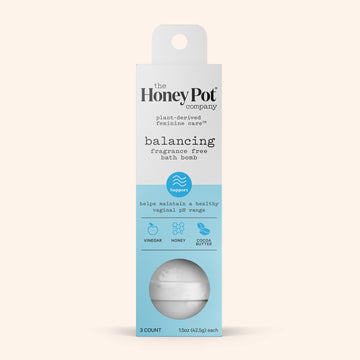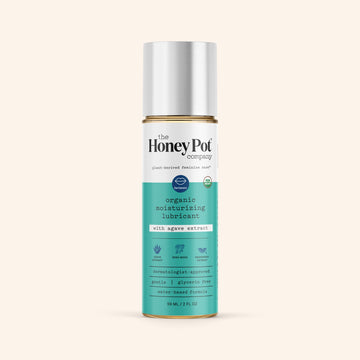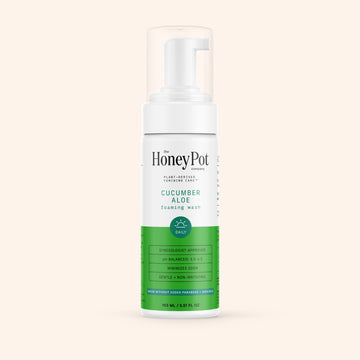
Wellness
Things That Impact Vaginal Health
In the whirlwind world we navigate daily, juggling everything from work to well-being, getting real about vaginal health isn't just a sidebar — it's essential. At Honey Pot, we're all about breaking down taboos and speaking the straight truth: every human with a vulva’s experience down south is as unique as they are.
Whether it's tuning into your body's signals or deciphering what your discharge is dishing out, understanding your vaginal health is key to feeling like your best, most balanced self. So, let's dive deep, ditch the hush-hush, and get into the nitty-gritty of what makes a happy, healthy honeypot!
What Exactly Is Vaginal Health Anyway?
Vaginal health goes beyond avoiding discomfort or infection — it's about nurturing an environment where the good bacteria thrive, and your body feels balanced and cared for. It's recognizing that a healthy vagina is part of your overall well-being, and what works for one person might not jive with another.
From the foods we eat to the stress we beat, numerous factors play into the state of our sacred space.
What Are the Signs Your Vaginal Health May Be Off Balance?
Knowing the cues your body gives when something isn't quite right down there is crucial.
Here's what to watch for, signaling it might be time to reassess your vaginal health routine or seek advice from a healthcare provider:
- Unexpected Changes in Discharge: A change in color, consistency, or smell could indicate an imbalance. While some variation is normal, significant shifts deserve attention.
- Persistent Itchiness or Discomfort: Feeling itchy or irritated on the regular isn't something to brush off. It's your body's way of saying, "Hey, we need to check this out."
- Recurring Yeast Infections or Bacterial Vaginosis: If you're frequently battling these, it might be time to look into underlying causes or lifestyle factors contributing to the imbalance.
- Uncomfortable Urination: Stinging or burning during peeing can point towards a urinary tract infection (UTI) or other issues needing professional care.
- Vaginal Dryness: Not just a menopause thing. Dryness can be linked to hormonal changes, certain medications, or not using the right kind of lubricants during sexual activity.
- Odor Changes: While the vagina isn't odorless, a significant or sudden change in smell can signal an imbalance that might need addressing.
What Factors Impact Vaginal Health?
Noticing something's up with your honeypot? Let's dive into what might be tipping the scales.
Diet and Nutrition
Food is a big one. If you don’t eat well, you probably don’t feel well, and the same goes for your vagina. Staying away from processed and fried foods and sugar helps keep your gut microbiome in check.
When your gut is “good,” so is everything else, including the pH of your vagina. When you have enough good bacteria in your biome, your body is better able to ward off annoying yeast infections, BV, and other vaginal infection causes.
If you’re looking to make some diet changes, check out our list of the top foods to eat for vaginal health.
Sexual Activity
Sex can also be a cause of some common vaginal problems. If you have P in V intercourse without a condom, the alkaline pH of semen can mix with the acidic pH of the vagina and cause a disruptive overgrowth of harmful bacteria.
The same goes for any penetrative sex toys. That’s why it’s always important to wash hands, toys, and your vagina after sexy time to reduce the growth of bacteria. Our sensitive feminine wash is perfect for these times; it calms irritation and helps boost your moisture levels while also balancing pH.
Stress and Lifestyle
Stress…the root of all evil. There’s no denying we live in stressful times, and with more stress than ever before, people are experiencing all kinds of anxiety and health issues. High amounts of stress throw everything off whack in your body, including your vaginal health.
Stress creates a hormonal imbalance that can cause everything from increased discharge and irregular periods to low libido and increased dryness during sex. To combat this, prioritize your sleep, which can help balance hormones, and practice self-care and exercise. Whatever it takes to help you feel like YOU!
Menstruation and Menopause
The menstrual cycle and menopause are pivotal in shaping vaginal health. During menstruation, fluctuations in hormones can lead to changes in vaginal discharge and pH levels, sometimes making the environment more susceptible to infections.
On the flip side, menopause brings its own set of challenges, including decreased estrogen levels which can lead to vaginal dryness and atrophy, affecting sexual health and comfort.
Saying “yes” to menstrual products that respect your body’s balance — like our organic cotton tampons — and understanding the shifts during menopause are key to maintaining vaginal wellness through every phase of life.
Clothing Choices
What you wear can also whisper sweet nothings to your vaginal health. Tight clothing and non-breathable fabrics, like those found in some activewear, can trap moisture and heat, creating a playground for bacteria and yeast.
Opting for loose, comfortable clothes and breathable, cotton underwear can significantly impact your vaginal ecosystem, allowing it to breathe and reducing the risk of irritation and infections. It's not just about style — it's about creating an environment where your vulva can thrive, staying cool, dry, and far from the grasp of unwelcome bacterial overgrowth.
Tips To Support Good Vaginal Health
Navigating vaginal health can seem like a maze, but with the right practices, you can keep your honeypot happy and thriving.
Here’s how:
Understand Your Anatomy
First things first — get familiar with your genital area, including the labia, clitoris, urethra, and cervix. Knowing what’s normal for you can help you detect changes early and seek advice when needed.
Embrace Probiotics
Incorporating foods rich in Lactobacillus or taking probiotic supplements can boost the presence of good bacteria in your vagina, promoting a balanced pH and fending off unwanted infections.
Choose Lubricants Wisely
Opt for water-based lubricants during sexual activity to prevent irritation and protect the delicate balance of your vagina. Avoid products with glycerin and harsh chemicals that can lead to dryness or disrupt your pH.
Trim With Care
If you choose to manage your pubic hair, do so safely. Trimming is often less disruptive than shaving or waxing, which can irritate the skin around your vulva and introduce bacteria.
Practice Safe Sex
Reducing the risk of sexually transmitted infections (STIs), including HPV, is paramount. Use condoms to protect yourself and maintain regular screenings with your healthcare provider to stay on top of your sexual health.
Care for Your Menstrual Health
Select menstrual products that align with your body's needs. Whether it's organic cotton tampons, pads, or menstrual cups, choosing products free from chemicals and fragrances supports a healthy vaginal environment.
Mind Your Hygiene Products
Ditch douching and harsh deodorants that promise to “cleanse” your vagina. Your vagina is self-cleaning, and these products can do more harm than good, stripping away natural oils and good bacteria, leading to overgrowth and discomfort.
Stay Informed About Over-the-Counter Solutions
While it's tempting to reach for over-the-counter remedies for issues like yeast infections, it’s wise to consult with a healthcare provider first. They can offer guidance on the most effective treatments without the risk of exacerbating problems.
Cultivate a Stress-Management Routine
Since stress impacts your entire body, including your vaginal health, finding ways to unwind and relax isn’t just good for your mind — it’s essential for your vagina, too.
The Bottom Line
Here at The Honey Pot Company, we desire every person with a vagina to know the inner workings of their body as a whole and how to best be in control of it. The happier and healthier you are as an individual, the happier and healthier your honeypot will be.
Sources:
Vaginal Health | American Sexual Health Association
Vagina: What's typical, what's not | Mayo Clinic






